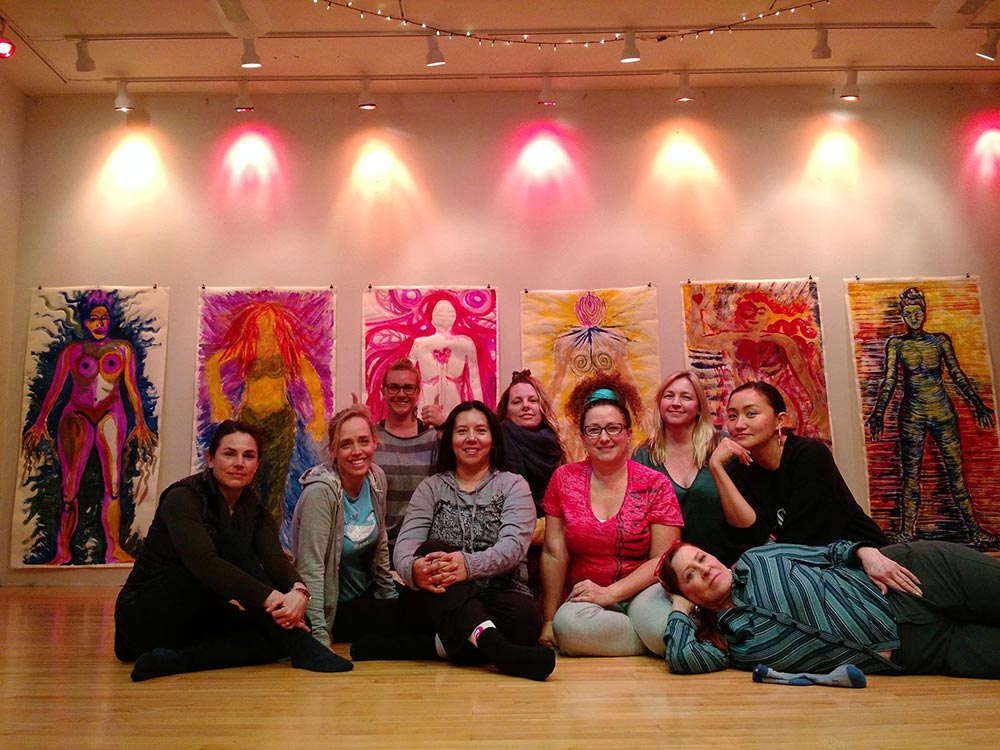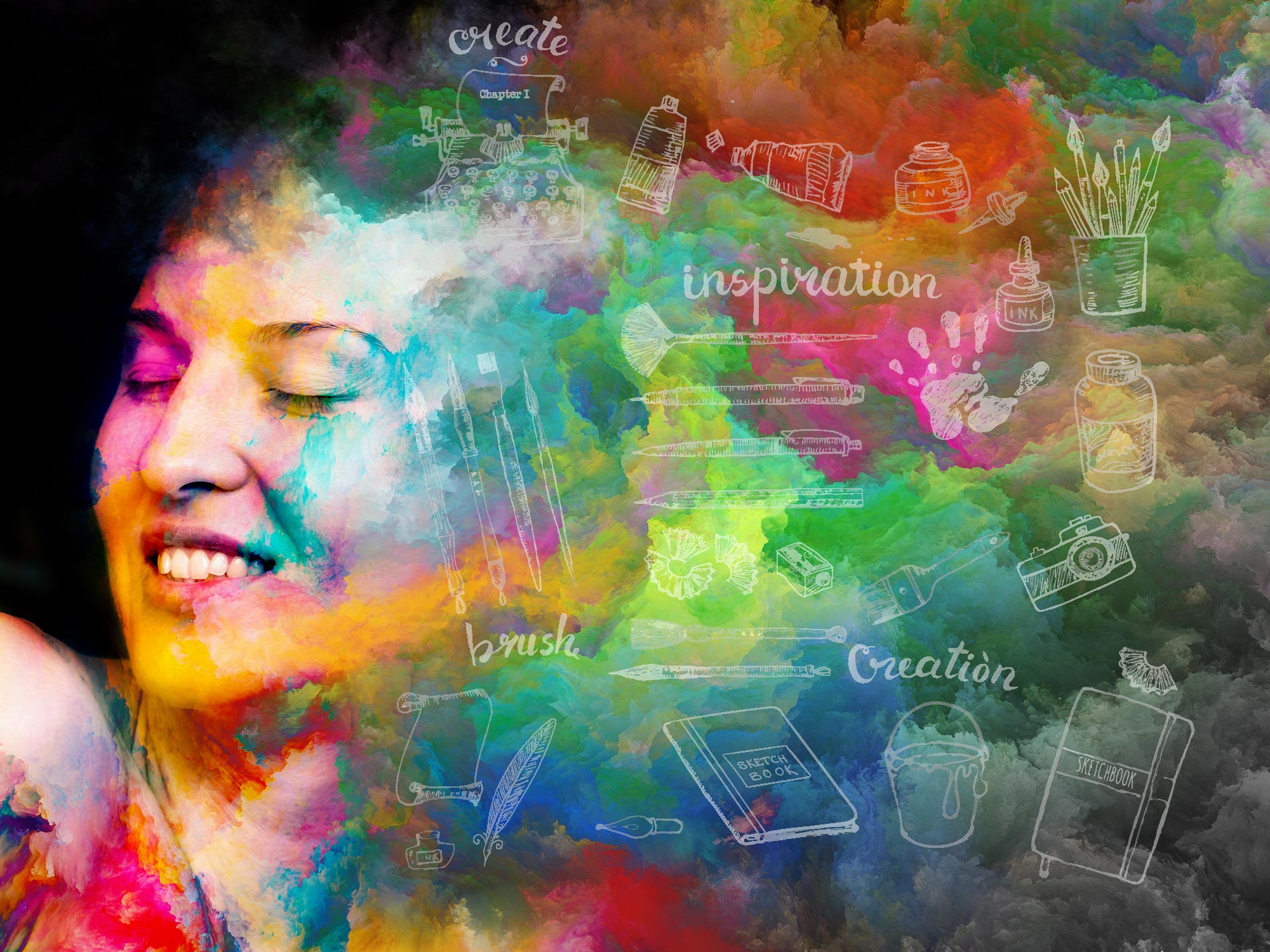Expressive Arts Institute brings the power of the imagination and the arts to your endeavor.

The modular curriculum is identical for all students. Specific areas of focus are supported in the self-study areas, and in specialized tracks at the European Graduate School (EGS) for students in the Master’s and CAGS programs.
Master’s students will assemble a portfolio of writing, artmaking, self-study, internship work and presentations to be reviewed at EGS. EGS requirements will vary by program, and are available on the website at: http://expressivearts.egs.edu/academic-program.
EGS University Modular Requirements are indicated with an *.
Additional courses are required for graduation from the Institute to meet local standards. All courses are taught in an adult learning community model.
Examinations are oral and presentation based.
“Dr. Essex is a professor and mentor I’m fortunate to have. Her expertise in facilitating a learning environment that allows experience, open-ended growth of trust and competency on both the individual and group levels is uniform. She has taught me to stretch the boundary of current ideas and relations in the modern world, encouraged individual creativity and thought, and continues to have a high expectation for student self-autonomy in learning by doing and making a life for ourselves. I look forward to becoming a colleague in the future with her in supporting the art and health community.”
Michelle Josey
Module K+ Entrance Requirements
Qualifying Bachelor’s Degree ( in fine arts, helping profession or related field) or sufficient college credits to take the ACCESS exam through European Graduate School.
- Community Art, Intermodality and Polyaesthetics*: How to make art with large groups & how this impacts the group dynamic and “group immune system”; the polyaesthetic imagination; working in teams.
- Intermodal Dance and the Post-Modern Body: primary aesthetics of dance/movement; embodied consciousness and the world; body-based performance; solo & ensemble skills. Observation and notation; performance as a way of knowing. Architecture of a Session.
- Intermodal Theater, Storytelling and Narrative*: primary aesthetics of theater; how “self” is a story, how we change the story with art-making; drama warm-ups; elements of theater (lighting, costume, mask, site specific performance). Aesthetic Analysis.
- Intermodal Music and Sound*: primary aesthetics of music; listening as the basis of music-making; creating soundscapes and scores to support performance; “kitchen instruments” and Ensemble Cruda. Rhythm and drumming. De-centering.
- Intermodal Visual Art – 2-D and 3-D*: primary aesthetics of visual arts; exploration of media (wet, dry, 3-D); projects for individuals and groups.
- Intermodal Poetry and the Oral Tradition*: primary aesthetics of poetry; performance poetry and written forms.
- Arts Based Research and Aesthetic Analysis*: art-making as a way of knowing; current theories on art-based research. Art analogue work.
- Eco-Aesthetics, Perception and the World: introduction to land-art, how perceiving is creating; site specific forms. Based upon the work of Wes Chester, Institute Director
- Presentations & exams*: Art oriented presentation with community as witness and co-researchers.
Module F+ Entrance Requirements
Participants should have already completed the required readings and coursework for Module K, 60 hours of advisor-approved artistic training with a master artist in a discipline of the student’s choice.
- Ethics and Menschenbild Section*: The Praxis of Intermodal Expressive Arts is supported by a philosophically informed worldview, which in turn may be used to generate an ethical standard of praxis. The course begins trough the exploration of and discourse of core field philosophies, and philosophical terms. It continues with special topics of ethical concern, based upon local standards of praxis, and existing codes of ethical behavior by related bodies such as IEATA. Students finish by examining the ethos of their own unique student community
- Philosophy and Menschenbild for Expressive Arts Practitioner*: the history, founding and philosophical underpinnings of the field of Expressive Arts Therapy; how our philosophy guides ethical and practical work in the field.
- Ethics, Law and Expressive Arts Practice*: scope of practice and scope of competency; rights of artworks; ethics of scholarship. Aesthetic responsibility.
- Medical Knowledge Assessment*: The resource oriented, aesthetically informed Expressive Arts give rise to an alternative, resource-based approach to the understanding of psychopathology. Expressive Arts practitioners use art indigenous theories, along with focus on salutogenesis and solution orientation as a companion to traditional diagnosis.
- Understanding Traditional Diagnosis and Treatment*: The students are exposed to the latest in medical theory regarding diagnosis and treatment of Mental Illness, as represented by the ICCD-9 and the DSM V. This knowledge is given within the context of working in treatment teams, or with referring professionals from the psychiatric field. Students are taught to be able to identify general clusters of diagnostic labels and what presenting behaviors might accompany a person bearing a diagnosis. However they are cautioned against reliance on medical model diagnosis in place of a thorough situational analysis.
- Salutogenic Approaches to Diagnosis, Treatment and Self-Care*: Developing a Sense of Congruency; resource oriented and recovery models of treatment, harm and shame reduction in addiction dynamics; motivational interviewing and solutions focus.
- Developmental Psychology Section*: Understanding milestones of human growth and development is a necessary component of the situational analysis needed for the praxis of Expressive Arts. Knowledge of the potential challenges and resources of the ages and stages of life lend competency and rigor to praxis. Both psychological and philosophically informed approaches are comparatively studied.
- Aesthetic Perspectives on Human Development 1*: Childhood and adolescent development: recognizing developmentally linked disorders, age and development appropriate treatment, play as an expressive arts methodology.
- Aesthetic Perspectives on Human Development 2: Adulthood, old age and dying. Ongoing development of the adult psyche, relationships and sexual health, career challenges, love and loss. Creating resilience through meaningful work and play.
- Social & Political Responsibility in the Community: How the world must interpenetrate the therapy room*. Considering the possibility of “Illness” as a rational response to an irrational world. Solution focused community action for change, addressing situational anxiety/depression.
- Philosophy and Menschenbild for Expressive Arts Practitioner*: the history, founding and philosophical underpinnings of the field of Expressive Arts Therapy; how our philosophy guides ethical and practical work in the field.
- Biography as a Resource:* Examining one’s narrative personal history is critical to developing an ethical and experientially based praxis. Students undergo a guided self-examination of the life narrative, along with the exploration of the historic and contemporary understanding of the concept of self. Awareness of one’s own narrative as a resource can lead to the differentiation between empathy and sympathy, and help the practitioner recognize possible issues of transference and the challenges these issues pose to mindful and ethical professional relationships.
- Presentation of Portfolios and Year 2 Exams*:The examination consists of an oral presentation artfully addresses an original research project, and how that work arises from and relates to the theory and praxis of Intermodal, Interdisciplinary Expressive Arts. The exam presentation will be assessed by faculty for depth of content, clarity of communication and artfulness of form, and a grade assigned.
- A Group Supervision Segment is included in each intensive meeting*.
Module P+
- Student Trainee Field Work, Supervision, and Seminars*: 600 supervised hours for Master’s students; 200 for licensed students.
- Master’s Degree students: Thesis Research & Writing Seminar*: Up to five group meetings as well as individual advisement meetings on the students chosen topic for the thesis project.
- Thesis Project: The thesis project is an original research project using Expressive Arts theory and artistic and practical components, which will incorporate learning elements from the entire module. The thesis is an academic project of 75-120 pages, exploring a topic approved by his or her thesis advisor. The project is a contribution to the field of expressive arts and will present the student’s original research into a specific topic with respect to population, diagnosis, arts and social and cultural contexts, supported by citations of existing literature and research in the field. Further requirements are outlined in the academic study guide for the European Graduate School.
Online Course
Introduction to Expressive Arts Therapy & Coaching
Founding Director Dr. Judith Greer Essex uses her 25+ years experience to help you rediscover dance, music, drama visual art and poetry as resources for living a richer, more rewarding life. Live like you mean it!


